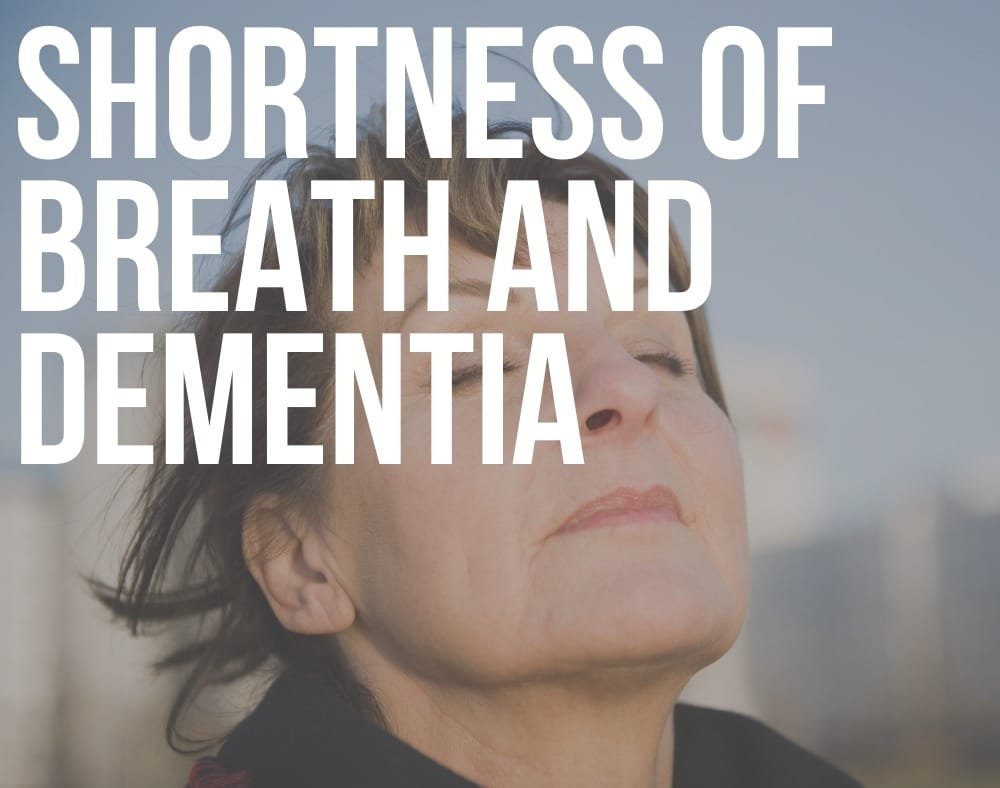After experiencing shortness of breath and dementia first hand, in family, I wanted to study it further.
I knew many face it, too, and a thorough overview is necessary.
Also known as dyspnea or “air hunger,” shortness of breath is one of the most common symptoms that persons with dementia experience.
Many people will experience shortness of breath as they GET CLOSER to their demise.
Below, I will uncover more details about the signs, causes, and how to treat dyspnea.
Signs of Dyspnea

Several signs may indicate that a person is suffering from shortness of breath. Some of them include:
- Feeling suffocated or smothered because of breathing difficulties
- Labored breathing
- Rapid shallow breathing
- Coughing
- Tightness in the chest
- Wheezing
- Heart palpitations
What Causes Shortness of Breath?

People experience dyspnea for a variety of reasons.
An individual can feel short of breath when traveling to a high altitude, after an intense workout program, or when going through major temperature changes.
In most cases, however, dyspnea is normally associated with health issues.
Here are SOME of the reasons a person may experience shortness of breath and dementia.
- Immobility: Many people with dementia especially during the last stages do not move about a lot. Being immobile can make one experience dyspnea because any exertion may lead to breathlessness.
- Existing medical issues: DR. Steven Wahls reports that heart failure, asthma, pneumonia, COPD (Chronic obstructive pulmonary disease), and interstitial lung disease are some of the most common causes of dyspnea.
- Drug interaction: Some medications that people with dementia take may list shortness of breath as one of their side effects.
- Allergic reactions
- Anxiety
- Exposure to dangerous levels of carbon monoxide
- Inhaling something or chocking on an item that blocks the breathing passageways
- Serious loss of blood that results in anaemia
- Hiatal hernia
- Obesity
- Collapsed lung
When to See a Doctor

Shortness of breath, in some cases, can be a sign of a life-threatening illness.
If a person is experiencing the severe onset of dyspnea, nausea, chest pain, or loss of the ability to function because of shortness of breath it is advisable to seek emergency medical treatment.
Shortness of Breath and Dementia Diagnosis Process
A physician can diagnose shortness of breath by conducting a comprehensive physical examination. And taking into consideration a full description of a person’s experiences.
Affected individuals SHOULD EXPLAIN how and when they started to experience air hunger.
They should also talk about the frequency, severity, and how long the attacks last.
Doctors may use CT (computed tomography) images and chest X-rays on persons with shortness of breath and dementia to help with diagnosis.
An Electrocardiogram may be conducted to reveal if a person has any heart attack warning signs or is experiencing other electrical problems in the heart.
Some doctors may also conduct spirometry tests that measure airflow as well as a person’s lung capacity.
Other tests may also be done to determine the LEVEL of OXYGEN in an individual’s blood.
Treating Dyspnea

Dyspnea treatment mainly depends on what is causing the problem.
For instance, a person who is experiencing shortness of breath because of overexertion just needs to stop and relax to get their breath back.
Persons who have COPD or asthma can use inhaled rescue bronchodilator when necessary.
Supplemental oxygen may be needed in severe cases.
Health care workers can also assist people who have shortness of breath and dementia EASILY. Especially when they are also suffering from other chronic conditions.

